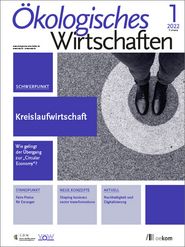New issue »Ökologisches Wirtschaften«: Circular Economy
If the climate targets are to be achieved, a different way of doing business is essential. The European Commission now also sees this and the circular economy has become a key element in the European Green Deal and for the transformation of current production and consumption patterns. In the new issue of ÖkologischesWirtschaften, the authors provide different perspectives on the circular economy and ask whether the circular economy can really be seen as a solution for decoupling growth from resource consumption.
In 2020, only 8.6 percent of the total global economy was circular. Therefore, issues related to improving the circular economy remain very important. In the new issue of ÖkologischesWirtschaften, the authors address questions such as: What are the concepts? What does the circular economy look like in practice? What role do companies, politicians and consumers play in the implementation of the circular economy? Will the circular economy lead to the decoupling of growth and resource extraction?
A general definition of the circular economy
In recent years, science has developed many approaches around the topic of circular economy and published many papers. It is about cradle to cradle, about recycling up to eco design. Some scientists look at the meso level, some at the macro level and others at the micro level of companies.
Julian Kirchherr et al. systematically analyzed more than 100 circular economy approaches and were able to distill an overarching definition: According to this, circular economy represents an economic system that replaces the "end-of-life" concept of products with reduction, reuse, recycling and recovery of materials in production/distribution and consumption processes. The goal is to achieve sustainable development while protecting the environment, promoting economic prosperity, and creating social equity.
The role of public procurement, politics and business
Green public procurement (GPP) plays an important role in the EU economy, accounting for about 14 percent of total GDP. In "From Green to Circular Public Procurement in Denmark," Heidi Simone Kristensen, Mette Alberg Mosgaard, and Arne Remmen introduce the concept of circular public procurement (CPP) as an extension of the current approach. Using the Danish furniture industry as an example, they demonstrate the benefits of integrating circular principles into current public procurement practices.
In order for the circular economy to work at the level of consumption, regulations on the lifespan and repair of products are important. For example, in their article "Circularity and repair policy in the European Union," Carl Dalhammar, Mariana López, Dávila, Leonidas Milios, and Jessika Luth Richter address the role of policy in supporting repairs and list the main barriers to doing so. They also address recent developments in the European Union and its member states in the article.
Laura Nießen and Nancy Bocken take the business perspective in "Circular business Models" and introduce the concept of the circular economy in the real economy. They address different strategies of companies that influence the resource cycle through reuse, recycling or composting.
The macro level: does circular economy really lead to absolute decoupling?
In their article "Reconciling Growth and Sustainability through Circular Economy?", IÖW scientists Eva Wiesemann, Sabrina Schmidt and Frieder Rubik address the big question of whether and how the desired reduction in overall resource consumption can actually be brought about. They shed light on how the circular economy fits into larger sustainability debates, link current circular economy initiatives to the growth debate, and highlight current gaps in business models, consumption patterns, and overarching narratives.
Reading samples:
- Ann-Cathrin Beermann: Faire Preise für Erzeuger
- Frieder Rubik, Sabrina Schmidt, Eva Wiesemann: Ciruclar Economy: „Rising Star“ and Challenges
To the table of contents of ÖkologischesWirtschaften 1/2022
++++
New in free online access:
Issue 1/2021: Rebound-Effects (only in german)
CO2 emissions are falling in the Corona pandemic to a level that may offer hope for the climate. In the issue 1/2021 ÖkologischesWirtschaften, the authors warn against this false conclusion: After all, emissions could rise more sharply after the crisis than before. This could be due to rebound effects, which are the focus of this issue. Still underexposed politically and in the media, they could be a key lever in reversing the climate crisis. The issue is now available for free online access: To the table of contents of ÖkologischesWirtschaften 1/2021



